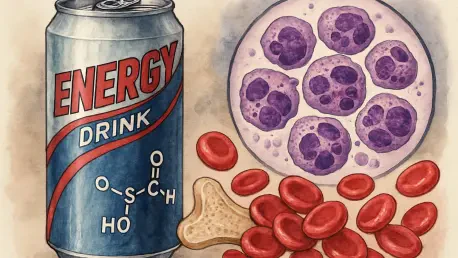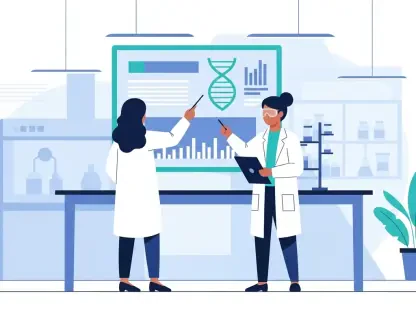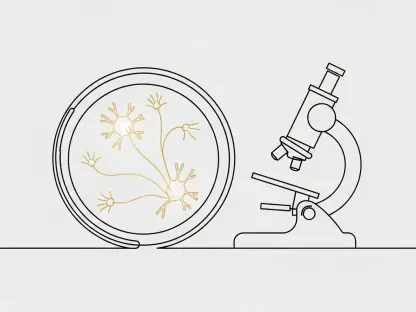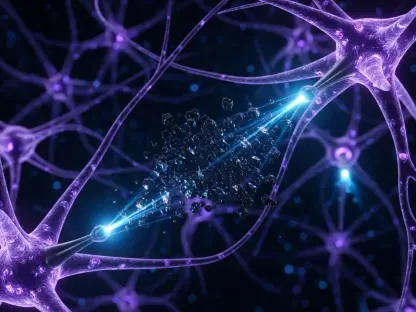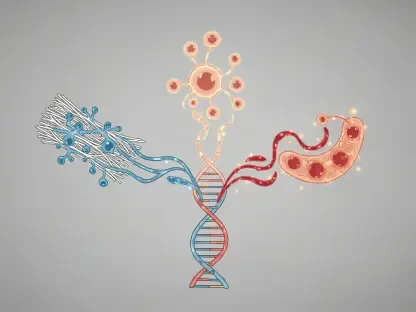In a world where energy drinks have become a staple for millions seeking a quick boost to combat fatigue, a startling revelation from recent scientific research has raised significant concerns about their safety, challenging the perception of these beverages as harmless pick-me-ups. These popular drinks, often marketed as performance enhancers, contain a variety of ingredients that promise increased alertness and stamina. However, a groundbreaking study has uncovered a potential link between one common component and the acceleration of certain types of cancer. This discovery prompts a deeper examination of their long-term health impacts. As consumers reach for that familiar can to power through a busy day or late-night study session, the question looms: could this daily habit be fueling something far more dangerous than just a caffeine rush? This article delves into the latest findings, exploring how a seemingly benign ingredient might play a sinister role in disease progression, and offers insights into safer alternatives for maintaining energy levels.
1. Unveiling the Connection Between Taurine and Cancer
A landmark study from a leading medical research institution has shed light on a troubling association between taurine, a common ingredient in many energy drinks, and the progression of leukemia. Published in a prestigious scientific journal, the research reveals that leukemia cells can exploit taurine present in the bone marrow to fuel their rapid growth. This process, described as metabolic hijacking, allows cancer cells to manipulate nutrient pathways for their benefit, accelerating tumor development. The study’s lead researcher emphasized that blocking taurine uptake by these malignant cells could potentially slow disease progression, opening new avenues for therapeutic strategies. While taurine is naturally occurring in the human body and found in foods like meat and fish, the concentrated synthetic doses delivered through energy drinks—often exceeding 1,000 milligrams per serving—may create an environment where cancer cells thrive. This finding has sparked urgent calls for further investigation into the safety of these beverages and their widespread consumption.
The implications of this research extend beyond the laboratory, raising critical questions about the safety of everyday dietary choices. Nutrition experts point out that the human body typically produces sufficient taurine on its own, rendering the additional intake from energy drinks unnecessary for most individuals. Unlike the balanced levels obtained from natural food sources, the synthetic taurine in these beverages introduces an artificial excess that could pose unknown risks. Plant-based diets, which inherently contain lower levels of taurine, have not been linked to deficiency issues, suggesting that the high doses in energy drinks might be an avoidable hazard. For consumers, this revelation underscores the importance of scrutinizing product labels and considering the potential long-term consequences of frequent consumption. As the scientific community continues to explore this connection, public awareness about the ingredients in popular drinks becomes paramount to making informed health decisions.
2. Consumer Awareness and Taurine Exposure Risks
Understanding the role of taurine in energy drinks is crucial for consumers who rely on these products for daily energy boosts. Many popular brands include significant amounts of synthetic taurine in their formulations, often far exceeding the levels found in natural dietary sources. While taurine from whole foods like fish or meat is integrated into a balanced nutritional profile, the concentrated doses in beverages may overwhelm the body’s natural regulatory mechanisms. Experts in oncology and dietetics have expressed concern that this excess could inadvertently support the growth of existing malignancies, particularly in individuals with undiagnosed conditions. For those hesitant to eliminate energy drinks entirely, practical steps include selecting taurine-free options, adhering to recommended daily limits of supplemental taurine intake, and staying vigilant for unusual health symptoms that might signal underlying issues requiring medical attention.
Beyond label-checking, the broader health context of taurine consumption warrants attention as research evolves. The European Food Safety Authority suggests a safe upper limit for supplemental taurine, yet many energy drink servings surpass this threshold in a single can. Animal studies have demonstrated that reducing taurine availability can slow cancer growth, but human trials are still in progress, leaving a gap in definitive guidance. Until more conclusive data emerges, adopting a precautionary approach is advisable. Consumers are encouraged to monitor their intake and consider the cumulative effect of multiple servings over time, especially if they have a family history of blood cancers or other risk factors. Consulting healthcare providers for personalized advice can help navigate these uncertainties, ensuring that energy-boosting habits do not inadvertently contribute to health risks. Public education on this topic remains essential to empower individuals with the knowledge needed to make safer choices.
3. Expert Guidance on Reducing Potential Health Hazards
Health professionals are stepping forward with actionable recommendations to mitigate the risks associated with taurine in energy drinks while further research is conducted. Oncologists and dietitians advocate replacing these beverages with alternative caffeine sources such as green tea or black coffee, which provide a similar energy lift without the added synthetic compounds. Additionally, incorporating whole foods like nuts, fruits, and eggs into daily routines offers sustainable energy without the potential downsides of processed additives. For individuals with genetic predispositions to blood cancers, regular screenings are strongly advised to catch any early signs of disease. These practical measures aim to balance the need for energy with the imperative of long-term health, providing a framework for safer consumption habits amidst emerging scientific concerns.
Looking at the broader landscape of cancer prevention, guidelines from major health organizations highlight the connection between processed foods and increased cancer risk, though taurine itself has not yet been classified as a carcinogen. The ongoing research into its role in leukemia progression has prompted calls for regulatory review of energy drink formulations to ensure consumer safety. Experts suggest exploring natural energy boosters like matcha or yerba mate as viable alternatives, alongside lifestyle adjustments such as prioritizing sleep and hydration. Foods rich in B-vitamins, including lentils and spinach, also support sustained energy levels without relying on synthetic ingredients. As the dialogue between researchers, regulators, and the public continues, these recommendations serve as a proactive step toward minimizing exposure to potential hazards while maintaining an active and energized lifestyle.
4. Reflecting on Safer Paths Forward
Looking back, the scientific community has taken significant strides in uncovering the potential risks tied to taurine in energy drinks, particularly its role in accelerating leukemia growth. The studies conducted provided a critical foundation for understanding how cancer cells could exploit metabolic pathways, prompting a reevaluation of common beverage ingredients. Health experts and organizations responded by advocating for reduced consumption and heightened awareness, ensuring that the public was informed about the latest findings. This collaborative effort between researchers and healthcare providers marked a pivotal moment in addressing the hidden dangers of seemingly innocuous products.
Moving forward, the focus should shift to actionable solutions and continued vigilance. Regulatory bodies are encouraged to reassess safety standards for energy drink ingredients, potentially setting stricter limits on synthetic taurine content. Meanwhile, consumers can take immediate steps by diversifying their energy sources and consulting medical professionals about personalized risk factors. Future research will be crucial in confirming these initial findings and exploring broader implications for other cancers. By fostering an environment of informed decision-making and proactive health management, society can better navigate the evolving landscape of dietary safety and disease prevention.
